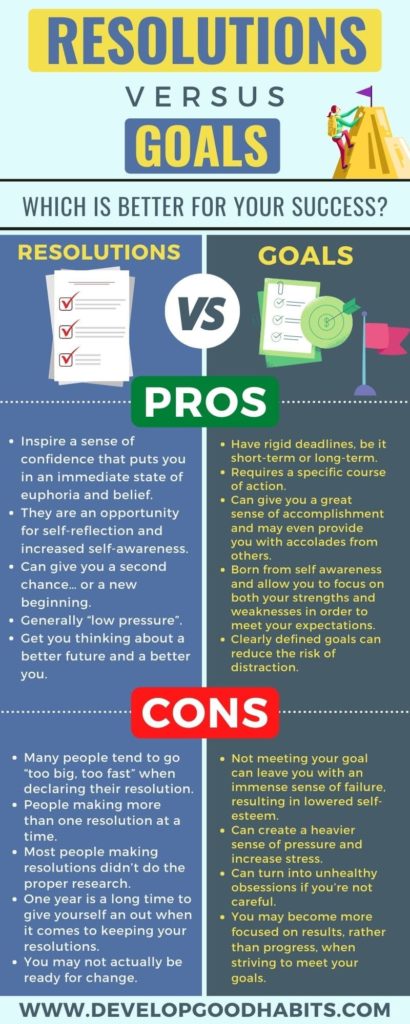It’s that time of year when you’ll start to hear people talking about their New Year’s resolutions. They’ll talk about losing weight, working out more, healthier eating habits, giving up smoking or beer, getting more organized, starting a new hobby or working less to spend more time with family.
Those are among the most common resolutions.
Maybe you’re one of these people too. And maybe you have one or more resolutions in mind already.
There’s nothing wrong with wanting to improve your life or try something new… but it’s important to understand that resolutions are only as good as the commitment you make to seeing them come to fruition.
Often, people will interchange the terms, resolutions and goals. While it’s understandable that many people see these words as one in the same, it’s crucial to understand the difference between resolutions vs goals in order to determine which one is more likely to give you the outcome you desire.
A Definition of Resolutions vs Goals
A resolution is a firm decision to do, or not to do, something. It is a promise to yourself and typically more open-ended, with no specific time frame for change.
Making a resolution usually involves changing some aspect of your life with statements of intent.
Most resolutions are intended to take effect immediately on January 1st and don’t often take into account extenuating circumstances that may derail your efforts. Although, many people do feel extremely happy and optimistic on that first day.
A goal is a targeted outcome that often has a timeline, be it short or long-term, and requires a specific plan of action in order to make it happen. Goals are not merely your intentions, they are a commitment.
Goals often involve steps to get you the result you desire.
For instance, if your goal is to lose 50 pounds, you will likely set targets to lose it in certain increments within a set amount of time (1-2 pounds per week is most healthy).
Goal setting tactics also allow for a margin of error, with built-in ways for you to get back on track.
If you're wondering how to set goals correctly, watch the video below to learn about the goal-setting mistakes that you might be making and how to overcome them.
Pros of Resolutions
1. Resolutions inspire a sense of confidence that puts you in an immediate state of euphoria and belief.
It’s true. Nothing feels better than toasting your loved ones on New Year’s Eve and declaring that this year will be your best yet!
Resolutions are not only promises to yourself, but often promises you make known to those closest to you… and that can help keep you accountable and believing that anything is possible.
2. Resolutions are an opportunity for self-reflection and increased self-awareness.
The New Year is a time to reflect on all that has happened in your life, and in the world, over the past 365 days.
You may even choose to write them down, or keep a journal, listing all that you are grateful for and all you’d like to change. And if you don’t like the way things have been going, resolutions are the perfect opportunity to switch gears fast.
3. Resolutions can give you a second chance… or a new beginning.
Life doesn’t always go according to plan. There is no master blueprint for our happiness, health or general wellbeing that we can follow in order to ensure it’s all sunshine and roses moving forward.
If you want to travel more, go online and book a trip right away. If you want to go back to school, register for at least one online course. Resolutions are all about deciding to live in the moment.
4. Resolutions are generally “low pressure”.
Because resolutions theoretically don’t expire for one year, you don’t necessarily feel the same amount of pressure as you would under a strict deadline. Resolutions are all about getting there… when you get there.
5. Resolutions get you thinking about a better future and a better you.
With each new year, you have the opportunity to revisit your priorities in life. This is a good thing, because our priorities constantly change as we grow and engage in new relationships.
Everything we do and every person we meet has an effect on us, whether we realize it or not. Taking time to let yourself see what matters most puts you one step closer to finding true happiness.
Cons of Resolutions
1. Many people tend to go “too big, too fast” when declaring their resolution.
This feeling of being overly confident can actually be detrimental to your progress. Think about it. If you’re trying to kick a caffeine habit after drinking 3 cups a day for the past 10 years, you are going to have a tough time on day 1 if you quit “cold turkey”.
Resolutions are often an “all or nothing” move, which can set you up for failure.
2. People making more than one resolution at a time often find they’ve bitten off more than they can chew.
If someone vows to lose weight and also quit smoking, for instance, they likely didn’t stop to think about how there is a tendency for newly declared “non-smokers” to gain weight initially.
This is because they are substituting one vice for another, taking comfort in food. It’s important to make sure that multiple resolutions can work simultaneously. You should also consider surrounding yourself with a support team to keep you grounded and motivated.
3. Most people making resolutions didn’t do the proper research.
If you are adamant about training for a 10k race, did you bother to think about how that would fit into your current schedule? What time of day are you most likely to stick to the plan so that it doesn’t fall to the wayside when life happens.
Conversely, if you want to save money each month, did you make a budget to help track your spending? If ordering or going out for lunch at work every day is one of your biggest expenses, getting rid of it means you’ll have to plan your meals now (at least a few every week).
It may also mean socializing less while your colleagues stick with their current routine. If you don’t put in the work that’s required to make the resolution obtainable, you will inevitably fail. Sheer will isn’t enough if you don’t plan the way.
4. While time seems to go by so fast, one year is a long time to give yourself an out when it comes to keeping your resolutions… especially the difficult ones that involve giving up something you love, or starting something you’re not excited about.
If you give yourself one year to find a better paying job, it’s easy to become frustrated and make excuses for staying put when the search doesn’t go your way.
That or you just become complacent. The more time passes, the more you’ll get comfortable with the idea of trying again next year… especially once people (including yourself) start to forget about the resolution or why you made it in the first place.
5. You may not actually be ready for change.
Human beings are creatures of habit. You may make your resolution with all the conviction you can muster, but without proper soul searching, you’ll never know if you are truly ready to see this thing through. Mindfulness plays a big role in whether or not you’re ready to sign on for this.
Pros of Goals
1. Goals have rigid deadlines, be it short-term or long-term.
In the workplace, goals are designed to meet certain requirements within a set amount of time. Personal goals are no different. If you want to see the change, you need to be the change.
And the best way to ensure change happens is by giving yourself a timeframe to get it done. Breaking your goals up into segmented tasks along a timeline is a smart way to go and will help prevent you from becoming frustrated. Take each small victory as it comes.
2. Reaching your goals requires a specific course of action. This often involves a clear cut plan, one that can be written down in steps.
For instance, if your goal is to relocate with your family to the West Coast, you’ll need to do a number of things in a strategic way to make sure it goes as smoothly as possible.
- Research the area for cost of homes and school ratings.
- Visit the area as a family.
- Send out your resume.
- Prepare your family and friends.
- Network.
- Secure a job.
- Select your home, find temporary lodging if necessary until everyone can make the move.
Ensuring that you follow a well designed plan is your best chance at success when it comes to making your goal a reality. Just be sure to leave room for unexpected surprises to increase your chances of staying the course.
3. Achieving a goal can give you a great sense of accomplishment and may even provide you with accolades from others.
The larger the goal, the more it likely means to you. Staying motivated so that you achieve your desired result is a feeling nobody can take away from you.
4. Goals are born from self awareness and allow you to focus on both your strengths and weaknesses in order to meet your expectations.
When contemplating setting a goal, you’ll need to begin with taking an honest look at yourself… the good and the bad. What do you do well? What could you do better? Who or what may be standing in your way?
Setting goals is a great opportunity to reconnect with yourself, reflect and develop a better awareness of what you need to be successful.
5. Clearly defined goals can reduce the risk of distraction.
If you have a goal, a purpose and a clear path to obtain what you want… you will be less likely to let anything stand in your way.
For example, a team leader seeking a promotion to VP is less likely to cut out early to play golf with friends, or turn down continuing education seminars, than someone who is content with where they are in their career and has no desire to change anything.
Cons of Goals
1. Not meeting your goal can leave you with an immense sense of failure, resulting in lowered self-esteem.
Because goals are often time sensitive and require so much planning, they have a tendency to consume a good part of your life. You will dedicate much of what you do and who you are to making your goals come to fruition.
So what happens if they don’t? As hard as you try and convince yourself that it’s ok, your mind has other plans, which can make it hard to look at yourself in the mirror until you can fix what went wrong.
2. Goals can create a heavier sense of pressure and increase stress.
If you are committed to reaching a goal within a certain amount of time, it’s like having a perpetual weight on your shoulders until you do.
I like to think of a piñata… the nerves and excitement of waiting for that final swing to break everything open. But knowing there’s a time stamp on your efforts can be stressful at times, which can be bad mentally and physically.
3. Goals can turn into unhealthy obsessions if you’re not careful.
If you’re setting one or more goals for yourself, it’s obviously pretty important to you. While that is a good thing, it can also turn dangerous if that is all you think about.
If losing weight before your wedding is your goal, and you’re not getting the results you want fast enough, you may have set unrealistic expectations in your planning. But if all you see is pushing yourself harder as a way to fix it, you’re missing the point and run the risk of alienating others and harming yourself.
4. You may become more focused on results, rather than progress, when striving to meet your goals.
Your state of mind is important when setting goals. While it’s great to look ahead to the big picture, you still need to allow yourself to stop and smell the roses now and again to fully appreciate how far you’ve come. It’s about the journey, not just the destination.
To Sum Up the Pros and Cons
To sum up what we’ve learned here, we’ve created this infographic comparing the pros and cons of setting resolutions vs goals. You may find that one, or all, hit a chord with you when it comes to deciding what you want from life… and how serious you are about making it happen.

How to Decide Between Resolutions and Goals
When deciding where you want your life to go, there are a few factors to consider whether or not it should be via resolution or goal setting.
Factors such as: your work ethic, willpower, timeline, the size of the change you want to make, how serious you are about things and your comfort level with potential failure.
Make a resolution if:
Set a goal if:
Final Thoughts on Resolutions vs. Goals: Which is Better for Success?
Resolutions are a wonderful concept and can truly inspire action among those in need of something more, or different. But a resolution can rarely stand on it’s own… in fact, you might think of it as the end result of a series of goals.
Let’s go back to the example of losing weight. If you make that your resolution for the year, setting smaller goals to help you determine how fast and how much you lose over time, will make you more likely to succeed. Otherwise, the urgency is just not there. The resolution is too vague.
Whereas if you set a goal to lose 100 lbs in a year and have a written plan, as well as done your research to help make it happen, you will likely get the results you want.
Goals are more about baby steps, not grand gestures, which is why they are often more successful and have long-term and lasting effects.
If you are truly serious about something, and want to decrease your chances of failure, check out this article on SMART goal setting. The most important thing to remember when making a resolution or a goal is to have an obtainable vision.
When goal setting comes into play, it will involve creating an actionable plan and often require you give it the necessary time it deserves to ensure your needs are met. It’s really the way to go if you want to incite real and lasting change.
And if you're looking for more resources on goal setting, check out these articles:
- 23 Goal Ideas to Set and Achieve
- 100 Ultimate Life Goals List
- Values VS Goals: Which is Better to Pursue?

Nicole Krause has been writing both personally and professionally for over 20 years. She holds a dual B.A. in English and Film Studies. Her work has appeared in some of the country’s top publications, major news outlets, online publications, and blogs. As a happily married (and extremely busy) mother of four… her articles primarily focus on parenting, marriage, family, finance, organization, and product reviews.
Finally, if you want to take your goal-setting efforts to the next level, check out this FREE printable worksheet and a step-by-step process that will help you set effective SMART goals.


